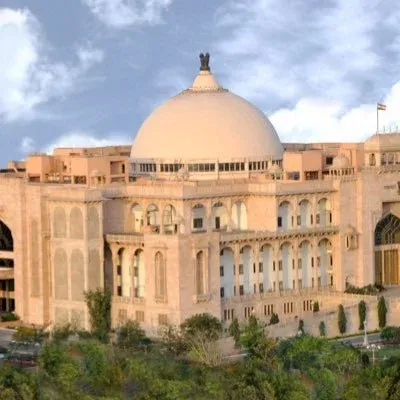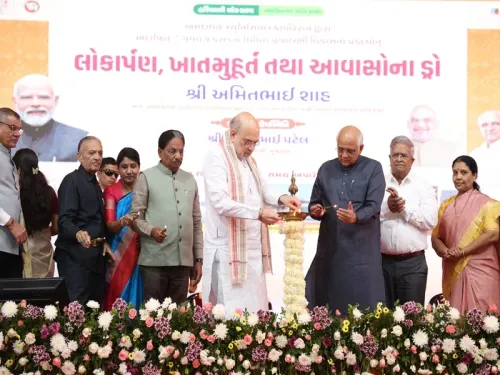What Happened in the Rajasthan Assembly Amid Crop Damage Protests?

Synopsis
Key Takeaways
- Major protests arose over crop damage in Rajasthan.
- Three significant bills were passed concerning labor and finances.
- New labor laws aim to empower workers and increase industrial investment.
- Protests highlighted the urgent need for farmer relief.
- The government's push for reforms continues amid opposition challenges.
Jaipur, Sep 4 (NationPress) A tumultuous session unfolded in the Rajasthan Assembly on Thursday as Congress MLAs raised a commotion regarding the devastating crop losses resulting from heavy rainfall.
The uproar necessitated the House to be adjourned twice. However, amidst the disorder, three critical bills were passed by voice vote, altering labour laws, state finances, and GST regulations. When the House reconvened at 2 pm after its earlier suspension around 12.30 pm, Congress MLAs surged into the well, shouting slogans and demanding prompt relief for farmers.
Speaker Vasudev Devnani consistently urged for order, stating, “I received the minister's response, but you all chose not to listen. Your MLAs entered the well and behaved inappropriately - I will not allow this.”
Despite the warnings, the chanting persisted, leading to further disruptions. The second sitting lasted merely 33 minutes before the session concluded.
Even amid the protests, the Assembly successfully passed three significant bills. These included the Factory (Rajasthan Amendment) Bill, 2025, the Rajasthan Appropriation (No. 3) Bill, 2025, and the Rajasthan GST (Second Amendment) Bill, 2025.
The highlight of the day was the Factory (Rajasthan Amendment) Bill, 2025, which Food and Civil Supplies Minister Sumit Godara indicated would “empower workers, promote women’s involvement, and draw new industrial investment.”
This amendment permits longer shifts, allowing workers to remain in factories for 10.5 hours daily.
By permitting fewer breaks and increased flexibility, it allows for up to 6 hours of work without a break. The expansion of overtime has been authorized as the work limit has increased to 144 hours per quarter, nearly double the previous 75.
The bill also permits night shifts for women with written consent, paving the way for greater women's empowerment.
Godara emphasized that this initiative will not only enhance productivity but also benefit migrant workers and strengthen Rajasthan’s investment environment. He stated that the alterations to the Factories Act, 1948, will benefit workers and empower women by allowing night shifts with consent, ultimately boosting industrial productivity.
The bill also increased daily working hours to 10.5, allowed 6-hour shifts without a break, and expanded overtime to 144 hours per quarter, he added.
Under the Rajasthan Appropriation (No. 3) Bill, 2025, Finance Minister Diya Kumari secured approval for an additional Rs 2,575.75 crore from the Consolidated Fund for the financial year 2025–26.
For the GST (Second Amendment) Bill, 2025, state health minister Gajendra Singh stated that increased GST collections have already repaid central loans and funded state development initiatives.
A proposal to circulate the bill for public opinion was dismissed. Following the passage of the bills, Speaker Devnani adjourned the Assembly until Monday, September 8.
Thursday’s session underscored both the urgency of farmer distress and the government’s resolve to implement reforms.
While Congress concentrated on crop damage, the ruling party highlighted the passage of three significant bills as a step towards labour empowerment, fiscal stability, and industrial growth, claimed BJP workers.










